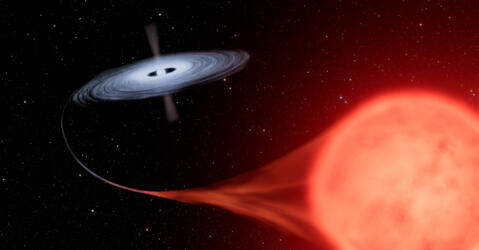You are here
Space
One hundred years after the death of the French astronomer and populariser of science Camille Flammarion, the CNRS physicist Jean-Philippe Uzan follows in the footsteps of his predecessor’s celebrated book Popular Astronomy, providing us with an accessible...
Article
01.16.2026
On 14 September, 2015, the international LIGO/Virgo collaboration detected the very first gravitational wave signal, a tiny distortion of spacetime predicted by Einstein, in this case produced by the merger of two black holes. The CNRS astrophysicist Marie-...
Article
11.03.2025
Why is the outermost part of the Sun's atmosphere, the corona, so much hotter than its surface? Ten years after formulating a hypothesis based on a numerical model, CNRS researchers have now used direct observations of the star's surface to confirm...
Article
10.09.2025
With large-scale observation campaigns, innovative data analysis methods and theoretical advances on all fronts, astrophysics and cosmology are entering a high-precision era with the potential to unravel many of the unsolved mysteries of the Universe....
Article
09.12.2025
Article
07.09.2025
During his “miraculous year” 120 years ago, Albert Einstein explained the photoelectric effect, laying the foundations of quantum mechanics. The historian of science Christian Bracco provides an...
03.18.2025
Over the past few months, our planet has been ìmpacted by intense solar flare activity on the Sun. This phenomenon, which caused the polar auroras that have been lighting up European skies up until...
Article
02.06.2025
White dwarfs are the extremely dense, compact remnants of stars that have ended their lives, and are at the origin of tremendous explosions known as novae. This phenomenon (not to be confused with...





